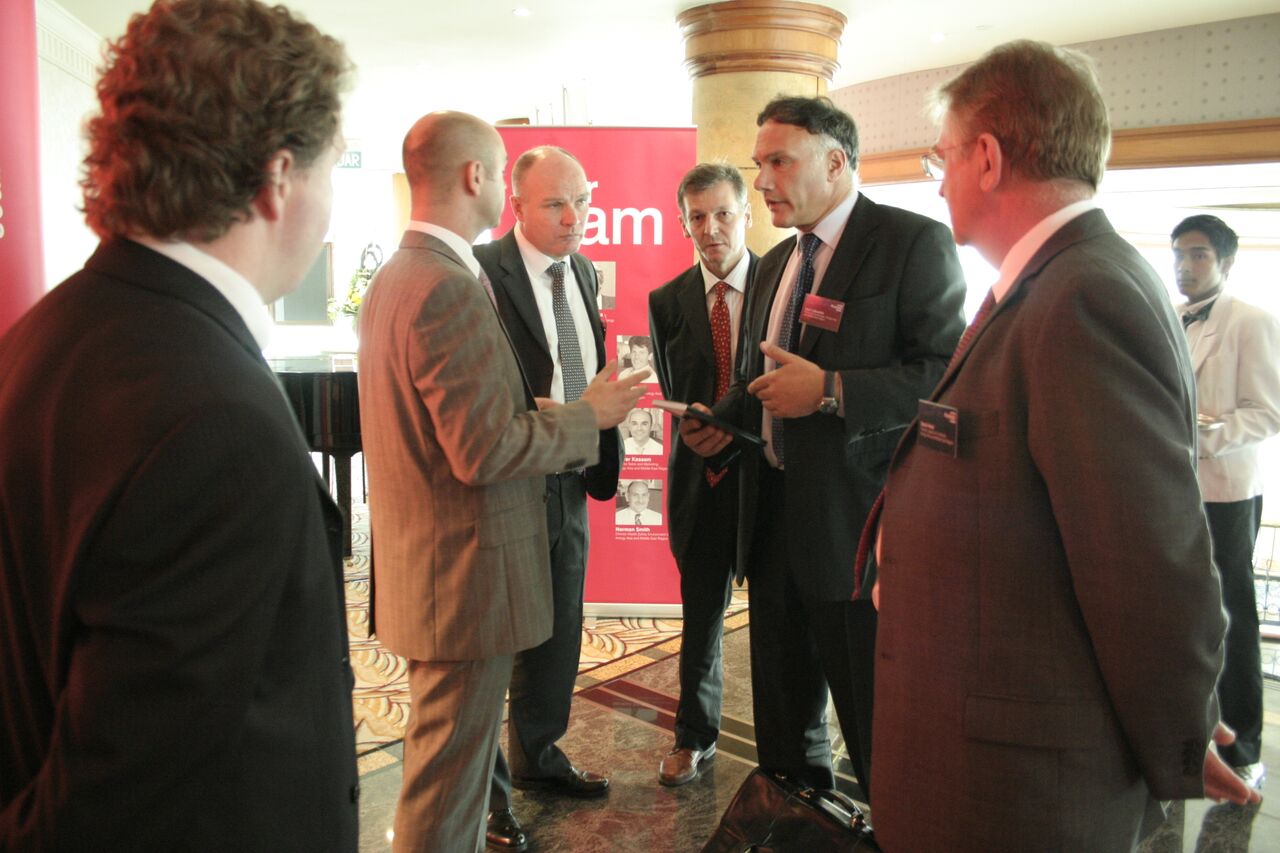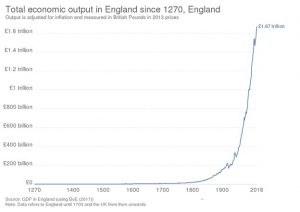
This startling graph
Look at the startling graph below. In about 1800 we moved from virtually nil economic output to an almost vertical explosion of productivity.

Graph 1. Economic output in England since 1270
Why? The age of reason and logic came along in the the form of The Enlightenment. A huge leap forward enabled rational thinking to probe and question our world, and the rest followed with the industrial revolution and government, giving us the freedom and prosperity we know today.
As we emerge post-Covid, what will happen to growth?
Pent up energy during Covid is now triggering a rush of mergers and acquisitions to captitalise on renewed consolidation and growth, really expressing how the ground has shifted since March 2020.
This is particularly true in the renewable energy sector, where creativity and inventiveness have developed massive wind farms and solar generation, not to mention a whole new electric car industry.

The setting for change. Wind turbines with blades each generating a whopping 14 megawatt are now delivering clean energy world-wide
Change requires change management
A major development in industry has been in ‘management science’. I grew up (1960s!) and went to university in England, but observed in my first job, there was a dearth of understanding in managing the complexities of behaviour and change. It wasn’t until I arrived in America that I saw how my new company was using new ‘management science’ to plan, grow and manage change. It has remained one of the most successful companies in the world.
We are lucky therefore to have the toolkits to bring about massive change which is now upon us, and indeed enhance the vertical rise of economic growth and prosperity.
Seeing the big picture
The Labovitch Consultancy through experience and research developed The Eight Pillars of Change https://labovitch.co.uk/the-8-pillars-of-change/ mixing rational and creative skills to provide a ‘big picture’ approach to delivering change. The rational – programme management ‘MS Project’ can be taught. Engagement, overcoming resistance and keeping an ‘even keel’ are more difficult to teach and you could argue arise from a pre-enlightenment era.
I’m often asked ‘Of the 8 Pillars of Change’, what are the most important factors to deliver success?’ You can review and come to your own conclusions. For me its:
The driving force for change is now mainly centred on technology and the ability to accelerate operations and communications. These include robotics, Artificial Intelligence (AI), internet and connectivity, machine learning, the power of data /analysis, technical research and social media platforms. Quite a change from the pre-industrial world where even building a road was a major undertaking.
For a short video on how to recover from the pandemic, please see:
https://www.linkedin.com/feed/update/urn:li:ugcPost:6675714625671098368/
Celebrating of The Enlightenment
Since Britain once led the world in virtually every aspect of industrialisation, no other country has embraced and then taken up the mantle of economic development more than the United States of America.

Wall Street NYC, along with London and other cities are now post enlightenment centres of commerce.

The New York Stock Exchange is a vehicle for fostering commerce, but the building itself celebrates the products of such commerce – meaningful work, science, learning, architecture, family life, health and prosperity.

Recovery from 9/11. An impressive new skyscraper pays tribute to the fallen, clearly stating that we will not return to the time before the enlightenment.

New York City’s courthouse (along with Corinthian columns!) celebrates the world sprung from the enlightenment. The caption reads ‘The true administration of justice is the firmest pillar of good government’.
Is Greta Thunberg right?
Greta Thunberg may eschew constant profits and growth, but which CEO would knowingly plan to stop his or her company growing, while the competition destroys their business? It’s the nature of commerce to reward the most creative and the best (see Graph 1). Why would we want to put the curve into reverse / decline?
It’s the logic which has taken us forward. The vertical rise out of mass poverty. The science, engineering and the exponential development of knowledge. And yet … the music and art, the drama, the sport have all created an irreplaceable new world. For me, I couldn’t imagine life without Beethoven symphonies, Michelangelo, Frank Lloyd Right and Leeds United Football Club!
We stand on the cusp of a remarkable time
As we return to our echoing offices we may well question "where do we go and have we the energy to take us there?"
Sad loss of loved ones, the lockdowns, the isolation have all taken their toll.
We also look at Graph 1 and the inspiring world which came before Covid. Was it all in vain? I don't think so.
The world will be different but we now have the knowledge to bring about lasting change for the better. And we will take the pent up forces of the past 18 months to foster growth, good government, new mergers and prosperity again.
Consider received wisdom versus a life driven by reason. A salutary reminder that we could have lived in a different age in a different period, where we’d have a subsistence life in remote and unconnected villages, needing to request permission to leave our patch.

Leon Labovitch is CEO of The Labovitch Consultancy www.labovitch.co.uk
The Labovitch approach to change is encapsulated in The Eight Pillars http://labovitch.co.uk/the-8-pillars-of-change/. A practical and tested method which works with clients to deliver rational and creative change
Strength for Change, Success for Transformation.
At The Labovitch Consultancy we are pleased to discuss any potential project with you even at the earliest stage. We will do so freely without cost or obligation but of course in the strictest confidence. Please Contact Us for more information.